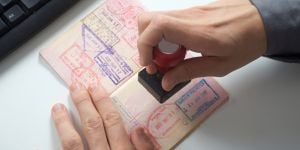
The rest of Europe has public healthcare, but the Netherlands goes against the tide; the Dutch healthcare system is privatized. However, this isn't really a cause for concern since it's heavily regulated. In fact, it's ranked 11th in the world for the best healthcare, so you'll be in good hands. If you're wondering how Dutch healthcare works, then keep reading. We'll give you all the details you need to know to see if it's a good country of residence for your family or not.
How the Dutch healthcare system works
Dutch health insurance is required by law to cover everything that falls under primary care; this includes doctor's visits, emergency room visits, hospitalizations, and prescription drugs. If you need anything else, such as physical therapy or eyeglasses, you'll have to either get a supplementary health insurance plan or pay for it out of pocket.
When you move here, one of the first things you want to do is register with your local GP (huisarts). Often, they aren't accepting new patients and/or have a long waiting list, so you'll want to register with a GP as soon as you can. Do note that you can only seek out GPs within a certain radius of your home.
Sometimes, GPs will schedule a consultation appointment to get a good picture of your health and medical history. So it's a good idea to bring your medical records for this appointment.
After this initial appointment, you can usually make appointments by either calling or using their online portal. Not all GPs offer home visits, and they only do so if you're too ill to travel. Regular appointments last 15 minutes max, so if you feel like you need more time than that, make sure to let them know when scheduling the appointment. If they feel you need a longer time slot, they'll book a double appointment for you.
How to choose your doctor in the Netherlands
There's a running joke that Dutch doctors prescribe paracetamol for everything, even if you've got a serious injury or illness. The truth is the Dutch healthcare system is reactive rather than proactive, so you may not be used to that.
While some GPs are starting to change their attitudes, you still might run into some that you butt heads with. In that case, you need to take charge and be your own advocate. It can be worth researching your condition and being firm with your doctor about what you wish to achieve.
Seeing specialists in the Netherlands
If you want to see a specialist during your stay in the Netherlands, you can't just make an appointment with one as you'd like in the United States or elsewhere. Your primary care physician (huisarts) is the gatekeeper for everything, so you need to go through them first.
Typically, you'd make an appointment with your GP to discuss the issue. Then, they'll decide if it's worth a referral or not. If so, then you'll usually be referred to the nearest hospital. In many cases, you'll be sent a letter in the near future with your appointment date and time. Some specialists are very busy and you'll just have to take whatever appointment you can get. Otherwise, you'll be given a number to call and you can then schedule your appointment that way.
After the pandemic happened in 2020, most (if not all) GPs did more telehealth sessions through the phone and online messages. This made it easier to get a referral; for example, if you have high myopia and would like to see an ophthalmologist for an examination, write to your GP with this information, and they should respond with a referral without you having to go into their office.
Most specialists are located in hospitals, not private practices. You'll need to look for a sign that says "poliklinieken" and the corresponding department number. If it's your first visit to this hospital, you need to first register at the front desk. Here, you'll give them all pertinent information, such as your full name, address, GP, and your insurance.
Free health checks in the Netherlands
While there's no universal healthcare system in the Netherlands, there are free health checks offered by the government. They are:
- Cervical smear tests every five years for women aged 30 to 60;
- Mammograms every two years for women aged 49 to 75;
- Fecal tests every two years for people aged 55 to 75.
Health insurance in the Netherlands
Health insurance is mandatory for expats in the Netherlands, but just the basic package. You must purchase a plan within four months of your arrival in the country. There are websites like Independer that help you search and compare different insurance providers, as well as their packages.
Typically, health insurance will cost around €150 a month per adult. You can lower your monthly premium by raising your deductible (eigen risico). For example, for 2024, the eigen risico is €385. However, you can raise that to a maximum of €885 for the maximum discount on your premium.
You can also add supplemental packages, such as dental and vision.
What's important to note is that your health insurance payments will be backdated on the day you arrive in the country. So, for instance, if you arrived in the Netherlands on 1 May 2024 but didn't purchase insurance until 1 June 2024, you'll still have to pay for the month of May.
Healthcare allowance in the Netherlands
Not everyone can afford to pay €150 per person per month, especially if they have more than one adult in the household. If this is your case, then you can apply for the healthcare allowance (zorgtoeslag). This is provided by the government to ease financial burdens for those with lower incomes.
As of 2024, single adults may not earn over €37,496 a year to get the healthcare allowance. For those with partners, this amount is €47,368 for the two of you. And as of 1 January 2024, your assets shouldn't be worth over €140,213 (this amount is €177,301 if you have a partner).
To apply for the healthcare allowance, go to the Mijn toeslagen website. It's in Dutch, but you can use Google Translate to figure things out. Do note that you'll need a DigiD to apply.
Health insurance for minors in the Netherlands
One of the greatest things about Dutch health insurance is kids' policies are free up until they're 18. Kids still need to have their own plans, but it's completely free of cost, with no premium or eigen risico. Plus, they're not locked into your provider, so if you find a better one for them, you can choose that one.
Health insurance for international students in the Netherlands
Are you only staying in the Netherlands while attending university? Then you may not have to take out Dutch health insurance. You're not considered a resident if you're only staying for your studies, so no Dutch health insurance is required.
If you're working while studying in the Netherlands (whether that's paid employment, internship, or volunteer work), you'll probably be insured under the Long-Term Care Act (Wlz). This means you'll need to have an active Dutch health insurance policy. You can always request a free assessment from the Sociale Verzekeringsbank to see if you're insured under the Wlz. If the payments are too much for you, then see if you can apply for the healthcare allowance for some financial relief.
For EU, EEA, and Swiss citizens who are eligible for their home country's social security system, you should get the European Health Insurance Card (EHIC), which is free. You can use your EHIC all over Europe to get either discounted or free medical services. However, note that this card doesn't replace travel insurance, so if you're going on vacation, you should still get a good policy.
As for non-EU and non-EEA citizens, you'll need to take out private health insurance if you're not working while studying. You won't be able to opt into Dutch public health insurance.
Switching health insurance companies in the Netherlands
Do note that you're only allowed to switch insurance providers once a year between January 1 and February 1, and you must cancel your current insurance by December 31. So if you're unhappy with your current provider, make sure you do your research and switch in that small window of time, or else you're stuck with your current insurer until the next year.
Hospitals in the Netherlands
There are three types of hospitals in the Netherlands: academic, teaching, and general.
Academic hospitals are paired with Dutch universities, and there are eight in the nation. You'll usually receive more specialized care since there are lots of researchers and specialists at these hospitals.
As the name suggests, teaching hospitals employ medical interns and nurses. They receive rigorous training at these hospitals. You can also receive more specialized care here and it's not uncommon to see interns attend appointments and procedures with the doctors to get first-hand experience.
Lastly, general hospitals are there for standard healthcare. If you need specialized care while at these hospitals, you can get a referral to an academic or teaching hospital.
If you need to stay overnight, you'll likely have to stay in a shared room with up to six people of mixed genders. You'll need to bring some of your own things, such as pajamas and toiletries.
How to get your medication in the Netherlands
At your appointment with your huisarts, they may prescribe you some medication. They'll ask you which pharmacy (apotheek) you prefer to pick it up at and will send the prescription there. Like with the GP, you'll "register" at a local pharmacy so that all your medications are sent there. You'll have to update your address if you move.
The apotheek is the only place you can pick up prescription medications from. You can also buy over-the-counter medications there. Some pharmacies are even combined with GP practices, so if you can manage to register at one, it will be very convenient.
When picking up your medications, you won't have to pay upfront. Instead, the pharmacy will bill your insurance company, and they'll send you the bill to pay if there is one.
For your convenience, many pharmacies have pick-up machines (automaten) outside. You won't have to stand in line to pick up your medications and you can also go after regular business hours. You'll need to first contact the pharmacy and ask for a PIN. You'll then enter it into the machine and it'll dispense your medicine.
If you need refills, you don't need to make an appointment with your huisarts. Either they'll make a note on your file (as with birth control pills), or you'll have to call them up to ask for a refill. There may be exceptions to this, such as if you're prescribed heavy and/or addictive prescription drugs.
If needed, you may be able to fill your prescription at other pharmacies.
Emergencies in the Netherlands
If you ever have a life-threatening emergency, the number to call is 112. This is similar to 119 and 911, as it'll prompt them to send an ambulance out to where you are.
Otherwise, if you have a serious emergency but it's not life-threatening (such as a broken arm), you can just visit your huisarts. Should your injury or ailment occur after regular hours, you can go to the huisartsenspost instead; you'll find them in your local hospital.
Pregnancy in the Netherlands
As with general healthcare, the Dutch are very reactive instead of proactive when it comes to pregnancy. Usually, you'll receive all of your prenatal care through a midwife. However, you'll receive very few screenings unless you have complications with your pregnancy.
When you're in your second trimester, the midwife will ask where you'd like to have your baby: at home or in the hospital. Around the same time, you can get in touch with a postnatal care (kraamzorg) organization. The amount of care you get depends on how your home situation is (how many children you have, if you have problems breastfeeding, etc.).
At the bare minimum, you'll get 24 hours over eight days. The rate is €5.10 euros per hour in 2024. However, you can usually get part or all of it covered by your health insurance, depending on what plan you have.
We do our best to provide accurate and up to date information. However, if you have noticed any inaccuracies in this article, please let us know in the comments section below.











